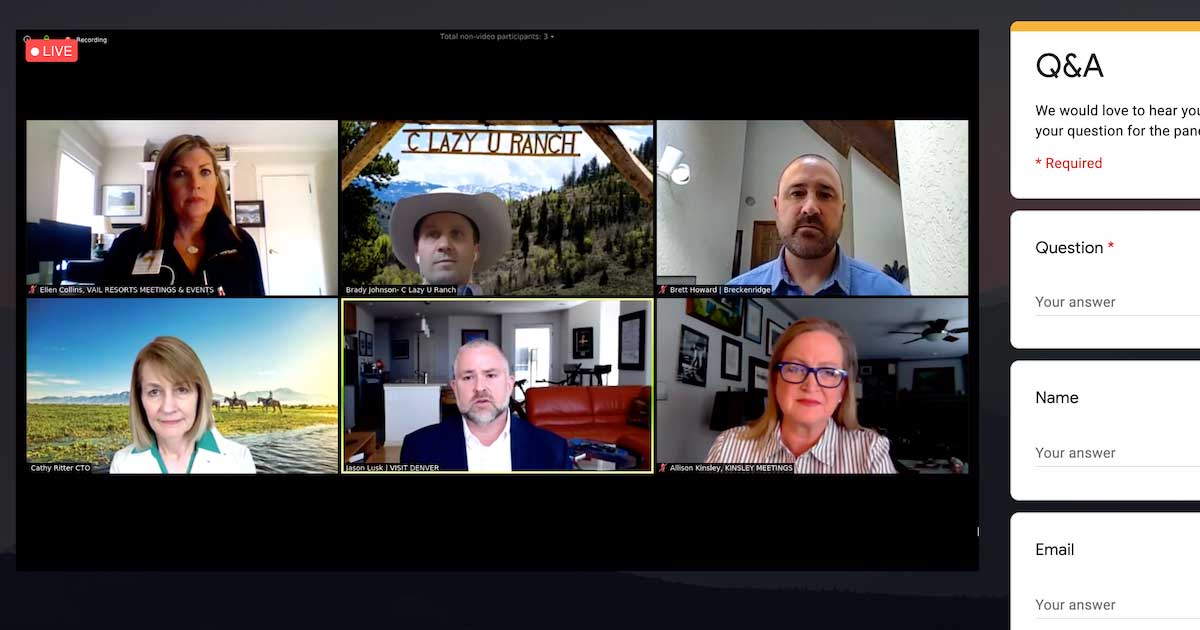On April 24, Destination Colorado played host to a webinar called “Aha Moments During the COVID Crisis and a Look to the Future.” A veteran meeting planner and destination leaders from across the state discussed a variety of pertinent issues they’re facing, with an audience of 1,200 participants (60 percent meeting planners) able to ask questions. (Destination Colorado is a nonprofit organization designed to provide resources and information for meeting planners and includes more than 130 members.)
The webinar was one of many examples we’ve seen in recent weeks of destinations developing more creative and in-depth ways to virtually reach out to audiences during the coronavirus pandemic. And this webinar was nearly entirely focused on issues and not on directly promoting the state. Consequently, the participants offered up a ton of valuable insights in one hour, touching on shifting roles, creative/appropriate marketing, safety regulations and much more.
Cathy Ritter, director of the Colorado Tourism Office, who noted that Colorado tourism generates $22.4 billion in revenue and $1.37 billion in local taxes, said the coronavirus pandemic made many industry veterans think back to Sept. 11, 2001, and the Great Recession of the late 2000s.
“Sometimes it makes more sense to wait and see what happens. What do we know about what’s going to be going on in July or October or November?”
“Those recessions were really investor-driven; this is a consumer-led recession, and the solution is to activate consumer spending,” she said. “The solution is somewhat simple: getting people out of their homes and getting them to spend again. Now, of course, there are barriers to that. But I think the path to recovery could be much swifter this time than the other recessions we’ve faced, and to me that’s very encouraging.”
Allison Kinsley, CMP, CMM, CED (MPI Rocky Mountain Chapter), chief meeting architect with Kinsley Meetings, talked about how the role of meeting planner has changed.
“If we can’t be planning, what is our role?” she said. “A lot of it has turned to being a consultant for our clients first about the potential impact of this virus and then guiding them in the communications process with their stakeholders.
“We’re really delving into and getting good at contract analysis. How are they being enforced, and how are they being interpreted? We are the people who are trying to ask for patience for some decisions at this point because people want to make decisions and say, ‘Yeah, I’m either cancelling or moving on, or doing something else with my meeting’ rather than having a face-to-face event. Sometimes it makes more sense to wait and see what happens. What do we know about what’s going to be going on in July or October or November? And if we do postpone a meeting, what does that mean? How do we get involved? If a meeting is cancelled, we obviously do the tidying up. But other alternatives are coming up as well, such as holding a hybrid meeting—some face to face combined with a virtual audience. That’s keeping us busy as well.”
MPI Coronavirus Education: Unite for Recovery
Kinsley said the importance of relationships is more obvious than ever, especially since so many hard conversations must take place. And this goes beyond industry-specific relationships to those with banks, accountants and insurers.
“We have to have business relationships as well as industry relationships to keep us going through tough times,” she said. “You don’t build relationships in the middle of as crisis—you do that beforehand, and that has really been very apparent for us.”
So how are tourism entities proactively preparing for the return of visitors and groups? Ritter says the Colorado Tourism Office has a forward-facing marketing plan called “Wait, Ready, Set, Go.”
“The theme of our campaign is ‘Let’s Co’—let’s Colorado. We’re turning Colorado into a verb,” she said. “But unlike the usual marketing plan, there are no dates on this calendar. We’re not paying attention to dates; we’re paying attention to data, and the thing that we’re looking to is being driven by outside forces. We’re not in that place where we normally try to shape our own destiny. The two main sources of input are 1) public health authorities’ rulings, edicts, decisions and 2) consumer sentiment. We have to be very sensitive to both. We can’t be inviting people back to our destinations before public health officials say it’s alright.
“Social messaging is really just organic right now, using user-generated content. And it’s really just inspirational messaging.”
“We are in the ‘wait’ phase right now. When we switch to that ready phase, that’s really when we’re going to be promoting an in-state campaign, and this is a temporary shift in our strategy. We’ve always directed our resources outside of our Colorado borders, but this will encompass things like Colorado Restaurant Week. We’re not asking partners to discount, but we are asking them to think about how they can put together value offers that we can first promote to an in-state audience and then to external audiences. And then we’ll keep broadening that marketing plan in ever-widening concentric circles. In the next phase we’ll start reaching out and marketing our border states and resilient travelers, and then finally when we move into the ‘go’ phase we’ll be back to full promotion targeting our national audience segments.”
Brett Howard, chief marketing officer for the Breckenridge Tourism Office, says his organization is also working on phased and tiered approaches as well.
“A lot of our paid media is paused, which is pretty normal right now for what we’re seeing,” he said, noting that some channels such as online travel agencies (Tripadvisor, Expedia, etc.) remain open. “The rationale behind that is, if people are on those channels are looking, we really feel like we should be serving them some information. Other things that remain open are things like paid search. Social messaging is really just organic right now, using user-generated content. And it’s really just inspirational messaging.”
Howard said it is also important to follow what those outside the tourism industry are doing.
“What are the sporting venues doing? That can give us a big indicator,” he said. “What are the concert venues doing? Museums and arts and culture facilities? Everyone’s situation is going to be a little bit different. We all are kind of adapting, but it’s just great to see what information is available.”
Jason Lusk, associate vice president of convention sales for Visit Denver, said the conversation about the safety and comfortability of travelers is “more about the whole journey of people who travel.”
“Think about your comfort level getting an Uber or a taxi right now, getting to the airport,” he said. “What we can sort of control, because we can have dialogues about it with the state and our community, is when they land, what does that look like? So, there will be a transportation conversation as part of that. Hotels, the convention center and food service will be drastically different for a while, we think. Will there be any sponsorship opportunities, like logoed masks? There will be opportunities for those who are innovative and put that filter on top of the regulations that will roll out.”
Watch the full discussion at Earth Coast LIVE.



